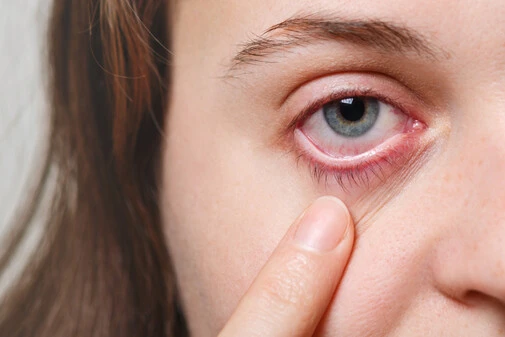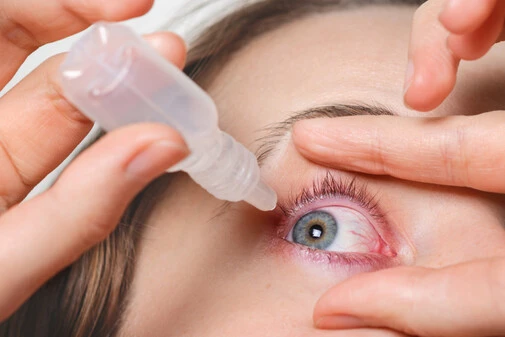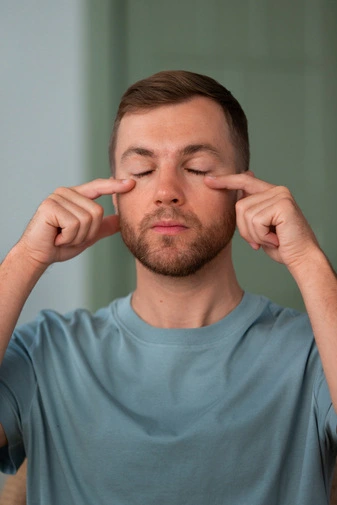How Vulnerable Are Our Eyes to Germs?
Our eyes are truly remarkable organs. They capture light and translate it into the vibrant world we perceive. But despite their complexity and seemingly tough exterior, our eyes are surprisingly vulnerable to germs.

This vulnerability stems from the delicate balance between sight and protection. Unlike our skin, which can form a thick barrier against bacteria and viruses, the eye's surface, the cornea, needs to be transparent to allow light through. This transparency comes at a cost, making the cornea susceptible to invasion by harmful microbes.
Rubbing our eyes is a common reflex when we are tired, uncomfortable with a foreign item, or experiencing dryness and irritation. While this may appear to be a quick remedy, it potentially worsens the problem. This is because, with each touch, we send bacteria from our hands — as well as everything else they've come into contact with since our previous cleaning — directly into one of our body's most sensitive locations.
The microbial world on our skin and under our fingernails
You may be surprised to hear about the variety of microscopic life that lives on our skin, commonly known as "skin flora." This ecology is not completely hostile; in fact, some of its inhabitants serve a beneficial purpose. However, certain bacteria have the potential to cause infections or illnesses if they breach the skin's protective barrier. This susceptibility makes our eyes a prime target for these organisms. As we interact with different surfaces, bacteria attach to our skin and seek sanctuary under our fingernails, where they grow and eventually reach other locations we touch, including our eyes.
However, our eyes aren't defenseless fortresses waiting to be breached. They come equipped with a multi-layered defense system:
Eyelashes:
These act as a physical barrier, filtering out dust, debris, and even some
larger airborne germs.
Blinking:
This seemingly simple act is crucial. Every
blink spreads a fresh layer of tears across the eye's surface, washing away any
irritants or microbes that might have landed.
Tears:
This isn't just salt water! Tears are a complex
mix of fluids that contain antibodies, enzymes, and lysozyme, a natural germ
fighter.


How Germs Invade Our Eyes
Despite these defenses, germs can still find ways to infiltrate our eyes. The most common culprit? Our own hands. Throughout the day, we touch countless surfaces, unknowingly picking up a menagerie of microbes. If we then rub our eyes, these germs can bypass our natural defenses and wreak havoc.
Contact with contaminated objects:
Sharing towels, using dirty makeup applicators, or even swimming in unclean water
can introduce germs.
Contact with contaminated objects:
Sharing towels, using dirty makeup applicators, or even swimming in unclean water
can introduce germs.
Airborne transmission:
Viruses like those causing pink
eye can spread through coughs and sneezes.
Wearing contact lenses:
While convenient, contact lenses
can trap germs next to the eye, increasing the risk of infection if proper hygiene isn't
maintained.
The Consequences of Germs in the Eyes
When germs breach our defenses, they can cause a range of eye infections, some mild and some more serious. Here are some common examples:
Conjunctivitis (pink eye):
This is a highly contagious inflammation of the conjunctiva, the thin membrane
lining the eyelid and eyeball.
Styes:
These are painful red bumps that form on the
eyelid due to a bacterial infection.
Corneal ulcers:
These are open sores on the cornea
that can cause significant vision problems if left untreated.


Protecting Your Eyes from Germs: Simple Steps for Big Benefits
The good news is that most eye infections are preventable with a few simple practices:
Wash your hands frequently:
Sharing towels, using dirty makeup applicators, or even swimming in unclean
water
can introduce germs.This is the single most effective way to prevent germs from
reaching your eyes. Use soap and water for at least 20 seconds, especially
before touching your eyes, putting in or removing contact lenses, or applying
makeup.
Don't rub your eyes:
It might feel good at the
moment, but rubbing irritates the eye and makes it more susceptible to
infection. If your eyes itch, try using artificial tears or a cool compress.
Practice good contact lens hygiene:
Always wash
your hands before handling your lenses. Clean and store them according to your
eye doctor's instructions.
Don't share personal items:
This includes towels,
washcloths, eye makeup, and applicators.
Avoid smoke and irritants:
Smoke and other
pollutants can irritate your eyes and make them more vulnerable to infection.
Schedule regular eye exams:
Your eye doctor can
check for signs of infection and advise on proper eye care practices.
By following these tips, you can significantly reduce your risk of eye infections and keep those windows to the world healthy and clear.
Conclusion
Keeping your eyes healthy doesn't require complicated routines or expensive products. By incorporating these simple habits into your daily life, you can safeguard your vision and ensure your eyes continue to be a remarkable window to the world.
Don't wait until you experience discomfort to prioritize eye care. Make healthy habits a part of your routine, and enjoy a lifetime of clear, vibrant vision!
If you feel eye discomfort or need regular eye exams, visit elite eye care!
